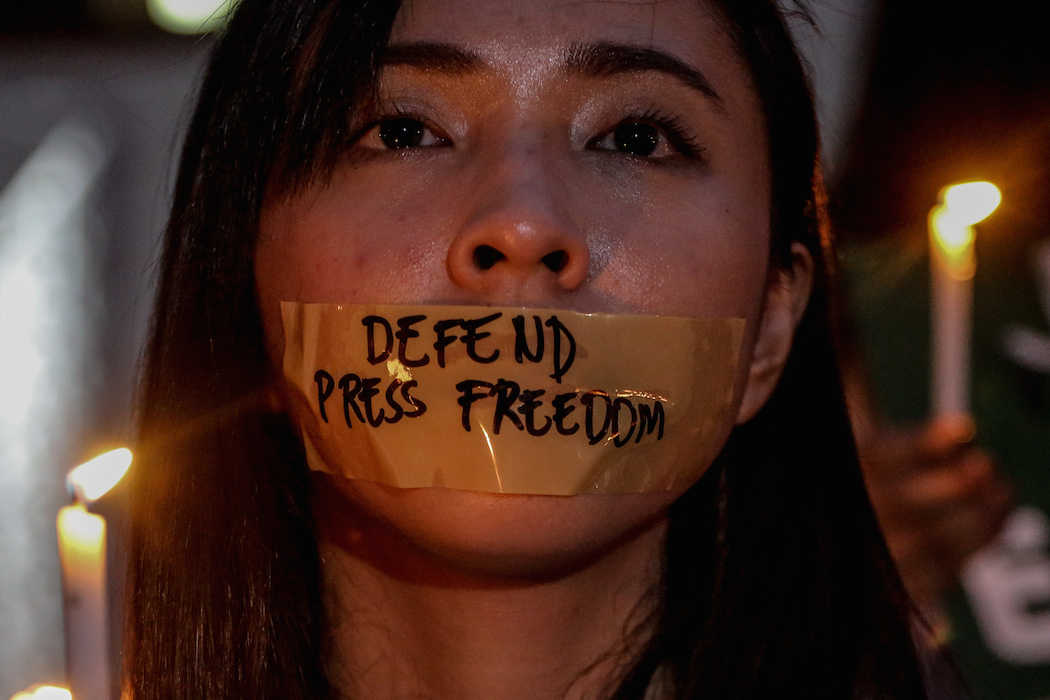
A student takes part in a demonstration in Manila on Jan. 17 to protest alleged attacks on media freedom in the Philippines. (Photo by Basilio Sepe)
Despite a slew of criticism leveled against the media — corporate ownership, alliances with political interests, corruption — it remains a pillar of democracy.
Media as a major "casualty" under authoritarian regimes and totalitarian societies is nothing new.
In Asia, where many societies have historically contested that the notion and practice of democracy is Westernized, "attacks" on the media have reached new levels in recent years.
In Cambodia, it was reported in the third quarter of 2017, that the government had closed 19 radio stations, some of which were the main source of news in rural areas.
The government's reason for the shutdown was "contract violations" for overselling program slots to broadcasters.
Meanwhile, the 24-year-old English-language Cambodia Daily was closed in September for "failing to pay a disputed US$6.3 million tax bill."
The editor of the newspaper, one of two-English language dailies in Cambodia, claimed that the closure was part of a move to curtail press freedom in anticipation of the 2018 election and amid growing dissent from civil society.
Using a "contract violation" and tax evasion as means to censor and censure media is not new either. These may be legitimate cases, but it's often difficult to separate such moves from political motives.
This was also the case with Philippine President Rodrigo Duterte's administration and online news site Rappler. The country's Securities and Exchange Commission revoked Rappler's license for allegedly violating the law.
For its part, Rappler had accused the government of violating rules of procedure and claimed that the move was politically motivated owing to the site's critical reportage of the presidency. A Rappler reporter has since been barred from covering events at the presidential palace.
In India, journalists continue to face an array of obstacles, including legal threats and arrest in connection with their work. Violence against journalists is encouraged by a prevailing climate of impunity.
In September 2017, journalist and editor Gauri Lankesh was gunned down. In March this year, three journalists were killed in suspicious vehicle accidents.
In recent years, social media has emerged as another threat to the media. Trolls, trolling and the rise of "fake news" have become large-scale projects organized, orchestrated, and funded to weaken and discredit media and its role in society.
This was seen in the case of Facebook and Cambridge Analytica, a political consulting firm. The latter has used the data of 50 million FB users not only for marketing needs, but with the alleged intent to manipulate elections.
In the Philippines, under a populist authoritarian regime, Duterte's verbal attacks on the media have been received with popular support, with the public largely considering the media as an enemy because of its "critical reportage" on the government.
The era of social media, however, is a double-edged sword as it has also democratized the production and dissemination of news resulting in the creation of more independent media organizations and platforms.
Sheila Coronel, dean of Academic Affairs of Columbia University's School of Journalism, said the world has been witnessing the dawn of the "golden age of muckraking."
"Today, there are muckrakers even in places like Armenia, Bulgaria, Nepal, Venezuela, the Arab world," she said. These groups have continued to serve the role of media as watchdogs and often in collaborative initiatives.
As a product of Western enlightenment and humanism, the media has always been perceived negatively in Southeast Asia as representing Western democracy and cultural essentialism.
A 2015 UNESCO study on the media in Southeast Asia noted that, "media development … has principally been a function of nation building."
"In contrast to the emphasis in Western traditions of individual expression and independence from government, media development in Southeast Asia has often been built on a singular vision of the national interest being the public interest and the state being the framer of that interest," read the study.
There have been two contending views. One is that the media in Southeast Asia should not follow the footsteps of Western media because it highlights "colonial experiences and exposure to Western learning," thus the way forward is to "de-Westernize the past" and "Asianize the present."
The other view is that preoccupation with such differences leads to a "dead end" of cultural essentialism. "Cultures are open systems with ongoing processes of hybridization," the study noted.
Without these contending views, the media (not the government-controlled) with its role as watchdog remains a strong ally of civil society, especially amidst intensifying political repression in South and Southeast Asia.
Some mainstream media, especially broadcast and online, are still traditional in the quest for the "scoop" and for what will "sell." But more and more there is opening for stronger collaboration with civil society.
A study by the Philippines-based Center for Media Freedom and Responsibility on how the media covered the conflict in Marawi last year noted the preponderance to focus on the "conduct of war" with the military as its main source.
The study underscores the need to cover and report on other stories unfolding in the context of conflict and/or war — mainly the impact on people and from the point of view of the people affected.
The media and civil society have a similar advocacy. Lankesh, the slain Indian journalist and activist, had warned about the need to defend the shrinking space for public debate.
This is an advocacy that the media and civil society share. Coronel had once advised journalism graduates that the main role of the media is to "speak truth to power." Similarly, this is what drives activists and members of civil society.
Clarissa V Militante works as consultant at Focus on the Global South and is author of the novels “Different Countries,” published in 2010 and “We Who Cannot Be Daughters,” published in 2014.


